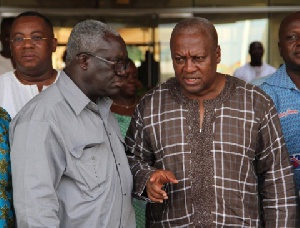Workers’ demand for wage increases due to recent utility tariffs adjustment and hikes in prices of petroleum products could face a potential stumbling block, as the International Monetary Fund (IMF) in its latest review of the economic programme has urged government to keep the wage bill within its budget limits.
Thousands of workers belonging to the Trades Union Congress (TUC) and other labour unions poured onto the streets in the various regions demanding that government reconsider the recent increases in utilities and petroleum products, or wages be increased to be commensurate with the adjustments in prices.
Apart from hitting the streets to protest the economic hardships, workers have planned to stay away from work as long as their demands remain unmet by government -- an intention that has been shelved following what organised labour described as “fruitful negotiations” with government officials, which have culminated in abandonment of a series of planned protests across the country.
Amid tensions on the labour front, the IMF has urged government to keep the screws on expenditure tight.
“With the government debt continuing to increase and financing remaining a challenge, the 2016 budget rightly aims at a stronger consolidation than originally envisaged. In this regard, it is essential that government sticks firmly to its policy of strict expenditure controls, by maintaining the wage bill within the budget limits while controlling discretionary spending and protecting priority spending…,” the Fund said in its report published last week.
The position of the Washington-based lender has been reiterated by Labour and Employment Minister Haruna Iddrisu, who said at a press conference prior to the workers’ protest that government is not considering scrapping the Energy Sector Levies Act that led to a more than 33 percent increase in prices of petroleum products.
But receiving the petition of the TUC leadership, the minister said government is however in a position to accommodate certain portions of the increases in utility prices -- although this will come at a higher cost to government and put the 2016 budget in jeopardy.
“In terms of the [utility] tariffs, we may be able as a government to accommodate a certain portion of it. The Public Utilities Regulatory Commission (PURC) is currently working out its numbers with the Ministry of Finance and the Ministry of Power,” the Employment and Labour Relations Minister said.
This year’s budget did not make room for subsidy in utilities, with government initially stating that a mere 5 percent reduction in the electricity tariffs could cost it GH?500million to offset such a shortfall.
Economist with the policy think-tank Institute for Fiscal Studies (IFS), Leslie Dwight-Mensah, expressed fears that yielding to the workers’ demands could be harmful to the budget unless there is a trade-off.
The trade-off, he stated, could see government either slashing its expenditure on goods and services or capital expenditure in order to accommodate the subsidies or wage increases the workers are asking for.
With President John Mahama’s administration seeking a renewal of its mandate in November, analysts are not sure whether his government will have the courage to slash capital expenditure not to mention the budget for goods and services -- thus incurring the wrath of voters.
Mr. Dwight-Mensah argued that should government compromise its stance with labour and still maintain its expenditure, then the budget deficit risks widening further in consonance with past election-year budgets.
Finance Minister Seth Terkper has projected that the budget deficit will reach 5.4 percent but yielding to labour agitations could leave this deficit wider, much farther from projections agreed with the International Monetary Fund.
Business News of Monday, 25 January 2016
Source: B&FT

















